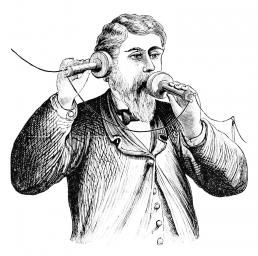Today’s Telephone
Today’s telephone has a long history as a part of American technology. It is American because an American, Alexander Graham Bell, invented it. The story begins very long ago, when there were no telephones. The only way to get a message to someone else was to write it and send it. Long ago there were messengers who traveled on foot. They were people who would run from place to place, transporting messages to other people. They would run miles, and they had great endurance. Later, communications improved in that people would send letters that traveled by wagons. In time, the mail would travel by train.
After the invention of a new communications tool, people could send messages quickly. That tool was the telegraph, which used a line that went from one place to another. It took years to put all the telegraph lines across America. At one end of the line a person used a device to send a message by code. At the other end, the message would be received and translated by another person. With those telegraph lines people could send messages almost immediately, although it was not “person to person.”
The telegraph was a remarkable invention, but it did not let people talk to each other. The telegraph meant the end of the pony express, which had been an American invention of another sort. The pony express involved riders who would carry a bag of mail from one place to another riding quickly on horses. It was like a relay race. Those riders were replaced by telegraph operators. They had to know the code to get the messages across the wires. On one end of the telegraph, an operator clicked the message. On the other end, a machine would make the same clicks. At first, a person had to listen and note what the clicks said. But then they figured out how to make the machine record them.
Still, there was no telephone. Then Alexander Graham Bell invented it. He tried many ways to get a machine that would work, and he was persistent because he failed many times. After many attempts, he perfected the machine. Once he had done that, the world all wanted telephones.
The next changes for the telephone were the same as the telegraph. People had to put in all those lines. If you see a picture of Chicago in 1900 you will see lots of wires downtown. The first telephone lines went from one person’s phone to another. Those were called landlines. Then they added what were called switching stations, so one line could reach more than one place. Still, it would take years to get the phone system to work more efficiently.
Today there are cell phones, which do not need wires. They use signals that travel through the air, carried by systems that depend on the science of physics. Many people now do not have a landline any more, and just depend on their cell phone. The cell phone is changing communication and even impacting how people live. It can connect people through texts as well as voice. It can download music from the Internet. Some people even use their computers to talk to other people with video screens. Those are the latest innovations in communication. So the telephone is still changing.
